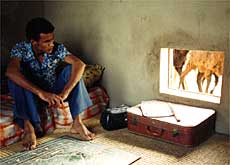Fribourg festival shrugs off controversy

Organisers of this year's Fribourg Film Festival say the controversy over a Palestinian documentary has brought bad publicity and dragged the event into the political arena.
They say the row has overshadowed the rest of the festival’s programme, notably a retrospective of musicals from the southern hemisphere.
The Argentinian film, “Historias minimas” scopped up Friboug’s “Regard d’Or” prize, worth SFr30,000.
Another Argentinian feature, “Caja Negra”, won the Special Jury prize, worth SFr5,000.
The documentary prize went to the Israeli film, “Kaddi Wind – Moroccan Chronicles”, which deals with the conflict in the Middle East.
Fribourg attracted unprecedented media attention with the screening of “Jenin… Jenin”, a harrowing documentary of Palestinians shortly after the Israeli incursion into the refugee camp in April 2002.
Prominent members of Switzerland’s Jewish and Israeli communities called for the film – by the Palestinian film-maker Mohamed Bakri – to be withdrawn on the grounds that it incited racial hatred.
But organisers refused to drop the film, and instead set up discussion forums to encourage viewers to air their opinions after every screening.
“We want to have discussions, but only after everyone’s seen the movie,” Jodok Kobelt, a spokesman for the event, told swissinfo.
“Everyone can come and then they can decide whether there are racist or discriminatory things in that movie.”
Political debate
Kobelt says he regrets the fact that the debate around the film has become overly political.
“It’s focusing too much on the politics. The film was made by director who wanted to focus on the grief of people – nothing but the grief,” says Kobelt.
“If the film had been about a camp in Africa rather than in the Middle East, there wouldn’t have been a such a fuss.”
Rather than stirring up political controversy, organisers say the goal of the festival is to start up cultural dialogue, and to enable film-makers from around the world to display their talents.
“It’s a festival which opens the door to countries of the southern hemisphere: Latin America, Asia, Africa,” says Kobelt. “It’s even more important to open up to other cultures when the political situation is so tense.”
High points
Highlights include the event’s opening film, “Heremakono” (“Waiting for Happiness”), directed by the Mauritanian director, Abderrahmane Sissako.
Sissako says his film, largely set in the Mali desert, is about the quest to find happiness against the odds and about those who wait for it to come to them.
“Perhaps that’s what happiness is all about: waiting,” he says.
A major part of this year’s festival is a sweeping retrospective of musicals dating from the 1940s onwards, largely by-passing productions from Hollywood and Bollywood, and instead honing in on Egypt, Brazil, South Africa and Jamaica.
“Musicals sometimes allow you much easier access to a different kind of society than documentaries or fiction, which are often littered with symbols and meanings that a foreign audience cannot grasp,” explains Kobelt.
“They also steer clear of much of the doom and gloom of other films,” he jokes.
Classics
Among the older gems is the Brazilian classic, “Carnaval Atlântida”.
It’s a parody that tells the story of a Brazilian film director who tries to emulate the big budget, Hollywood musicals. He fails and his film instead turns into a homage of his native country’s music and folklore.
“This film is still very relevant today, fifty years after it was made,” Eduardo Giffoni Florido, a Brazilian film critic, told swissinfo.
“It looks at the impact of cultural imperialism on a country’s popular culture. And it shows that Brazilian film is still trying to position itself in a niche market, just as it was back then.”
Florido believes that festivals such as Fribourg provide a vital alternative to mainstream, Hollywood cinema, even though they may not bring commercial rewards.
“Festivals like Fribourg are important for foreign films,” he explains. “Not so much in terms of distribution, because it’s clear that the films being screened here will never be widely distributed; but they give viewers a chance have a fresh insight into developing countries and they are proof that quality films exist outside of Hollywood.”
Musicals
One of the weightier musicals being screening is Fribourg’s closing film, “Nha Fala”, set in Guinea-Bissau.
Its main character, Vita, wrestles with a family legend that says that any woman who sings will die.
Director Flora Gomes says shooting the film as a musical enabled her to tell the darker story of a country emerging from a forgotten civil war in a lighter form.
“[The words] Nha Fala mean all at once: my voice, my fate, my life and my path,” explains Gomes.
“I wanted to marry these words while focusing on apparently the most futile, the least indispensable of the four: the voice, the song.”
“For me, singing has always been a symbol of freedom.”
The Fribourg Film Festival runs until March 23.
swissinfo, Vanessa Mock
More than 60 films are being screened at the festival.
A SFr30,000 prize is awarded every year to a full-length film, while numerous smaller prizes are given to other feature films and short films.
Documentaries are being included in the competition for the first time this year.
The festival’s budget is SFr1.5 million.
The Argentinian film, “Historias Minimas”, scooped the “Regard d’Or” prize, worth SFr30,000.
Another Argentinian feature, “Caja Negra”, won the Special Jury prize.
The documentary prize went to the Israeli film, “Kaddim Wind – Moroccan Chronicles”, which addresses the conflict in the Middle East.

In compliance with the JTI standards
More: SWI swissinfo.ch certified by the Journalism Trust Initiative
You can find an overview of ongoing debates with our journalists here . Please join us!
If you want to start a conversation about a topic raised in this article or want to report factual errors, email us at english@swissinfo.ch.